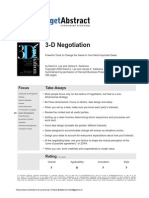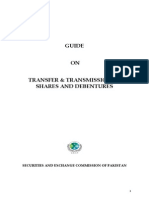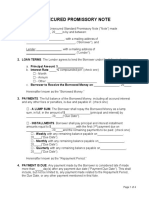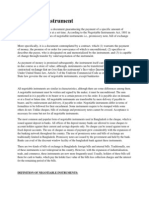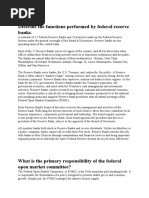100%(3)100% found this document useful (3 votes)
UCC Flow Chart
UCC Flow Chart
Uploaded by
AGreenUCC 2-207 governs contracts formed between merchants where the acceptance or confirmation contains additional or different terms from the original offer. Under 2-207(1), these additional terms become part of the contract unless they materially alter it or the offer limits acceptance to its terms. If the acceptance is expressly conditional on consent to the new terms, it is a counteroffer rather than an acceptance. For acceptances, conflicting terms are resolved by the "knockout rule" which disregards both terms and uses UCC defaults, or by allowing the offer term to remain while disregarding the different reply term. The flowchart outlines the steps for analyzing acceptance vs counteroffer and resolving different terms under UCC 2-207
Copyright:
© All Rights Reserved
Available Formats
Download as PDF, TXT or read online from Scribd
Download as pdf or txt
UCC Flow Chart
UCC Flow Chart
Uploaded by
AGreen100%(3)100% found this document useful (3 votes)
UCC 2-207 governs contracts formed between merchants where the acceptance or confirmation contains additional or different terms from the original offer. Under 2-207(1), these additional terms become part of the contract unless they materially alter it or the offer limits acceptance to its terms. If the acceptance is expressly conditional on consent to the new terms, it is a counteroffer rather than an acceptance. For acceptances, conflicting terms are resolved by the "knockout rule" which disregards both terms and uses UCC defaults, or by allowing the offer term to remain while disregarding the different reply term. The flowchart outlines the steps for analyzing acceptance vs counteroffer and resolving different terms under UCC 2-207
Copyright
© © All Rights Reserved
Available Formats
PDF, TXT or read online from Scribd
Share this document
Did you find this document useful?
Is this content inappropriate?
UCC 2-207 governs contracts formed between merchants where the acceptance or confirmation contains additional or different terms from the original offer. Under 2-207(1), these additional terms become part of the contract unless they materially alter it or the offer limits acceptance to its terms. If the acceptance is expressly conditional on consent to the new terms, it is a counteroffer rather than an acceptance. For acceptances, conflicting terms are resolved by the "knockout rule" which disregards both terms and uses UCC defaults, or by allowing the offer term to remain while disregarding the different reply term. The flowchart outlines the steps for analyzing acceptance vs counteroffer and resolving different terms under UCC 2-207
Copyright:
© All Rights Reserved
Available Formats
Download as PDF, TXT or read online from Scribd
Download as pdf or txt
100%(3)100% found this document useful (3 votes)
UCC Flow Chart
UCC Flow Chart
Uploaded by
AGreenUCC 2-207 governs contracts formed between merchants where the acceptance or confirmation contains additional or different terms from the original offer. Under 2-207(1), these additional terms become part of the contract unless they materially alter it or the offer limits acceptance to its terms. If the acceptance is expressly conditional on consent to the new terms, it is a counteroffer rather than an acceptance. For acceptances, conflicting terms are resolved by the "knockout rule" which disregards both terms and uses UCC defaults, or by allowing the offer term to remain while disregarding the different reply term. The flowchart outlines the steps for analyzing acceptance vs counteroffer and resolving different terms under UCC 2-207
Copyright:
© All Rights Reserved
Available Formats
Download as PDF, TXT or read online from Scribd
Download as pdf or txt
You are on page 1/ 2
10/13/21, 11:03 AM OneNote
UCC 2-207 Flow Chart
Monday, October 4, 2021 12:19 PM
Offer vs. Reply Document (Acceptance)
1) Look at doc. No. 2
"A definite and seasonable expression of acceptance or a written confirmation which is sent within a
reasonable time operates as an acceptance even though it states terms additional to or different from
those offered or agreed upon, unless acceptance is expressly made conditional on assent to the
additional or different terms
2) Look at doc. No. 1 (if no. 2 is acceptance)
"The additional terms are to be construed as proposals for addition to the contract. Between merchants
such terms become part of the contract unless:
• The offer expressly limits acceptance to the terms of the offer
• They materially alter it (hardship or surprise); or
• Notification of objection to them has already been given or it is give within a reasonable time after
notice of them is received
*if not between two merchants, the additional merchants, the term will not go in
3) If reply document is expressly conditioned language, it’s a counteroffer, move to 2-207 (3)
If you act like you're in a contract, the actual terms will be whatever you agreed on
—>Terms the two merchants agreed upon + any UCC default
Examples of expressly conditioned language
"seller's acceptance is expressly conditioned on Buyer's assent to the additional or different terms
and conditions set forth below and printed on the reverse side"
NOT expressly conditioned language:
https://nesl-my.sharepoint.com/personal/alexandra_m_green_nesl_edu/_layouts/15/Doc.aspx?sourcedoc={e5da7078-447a-4137-9437-71cc14a52ae9}&action=edit&… 1/2
10/13/21, 11:03 AM OneNote
"This is an acceptance only if the additional terms
Additional term: when reply document puts in something new that was not remotely in offer
Different term: when reply document puts in something that conflicts with a term that was in the offer
When there are different terms: knockout or dropout (if acceptance)
Go to 2-207(1) to find out acceptance or counteroffer
If it's an acceptance, Skip 2-207(2)
Either drop both terms and use default terms (knockout rule), or drop the reply term and use offer
version
Opposite of mirror image and last shot doctrine
Different term e.g.
Offer: Acceptance:
Same price term same price term
Diff term: red diff term blue
Solution:
2-207 (1) If acceptance, don’t use 2-207 (2), either knockout rule and use the UCC default, or the FIRST
red term of the offer will go in (term in the reply will drop out, leaving offering term as the governing
term)
If a counter-offer, go to 2-207 (3)
*not last-shot doctrine*
Battle of the forms, "boiler forms", something additional or different in terms of reply document, trying
to find out if new terms go into the contracts—use UCC 2-207
Counter-offer in classical common law (SERVICES, NOT GOODS)
Mirror image/last shot
In common law for services, use last shot doctrine for counteroffer, reply doctrine goes in the contract
You can accept by conduct (Princess case)
Mirror image rule: anything that does not mirror offer is a counteroffer
Intent to be bound UCC 2-204, Restatement §27
Open Price term UCC 2-305 (In common law, open price term= no contract)
Illusory promises, if within someone's discretion to decide whether or not to be bound
Doesn't destroy, you can still accept by performance, converts a bilateral contract into a unilateral
https://nesl-my.sharepoint.com/personal/alexandra_m_green_nesl_edu/_layouts/15/Doc.aspx?sourcedoc={e5da7078-447a-4137-9437-71cc14a52ae9}&action=edit&… 2/2
You might also like
- Documentation of E-Commerce Website Requirements and Designing74% (72)Documentation of E-Commerce Website Requirements and Designing14 pages
- Security: Financial Terms Related To SecurityNo ratings yetSecurity: Financial Terms Related To Security6 pages
- Guide ON Transfer & Transmission of Shares and Debentures100% (2)Guide ON Transfer & Transmission of Shares and Debentures10 pages
- US Internal Revenue Service: f1099c - 2005No ratings yetUS Internal Revenue Service: f1099c - 20056 pages
- Non Retirement Withdrawal Request Form Jhi PDFNo ratings yetNon Retirement Withdrawal Request Form Jhi PDF3 pages
- IDFCFIRSTBankstatement 10106858818 210144580% (1)IDFCFIRSTBankstatement 10106858818 2101445827 pages
- SEC Cease-And-Desist Order Against Fieldstone Financial Management Group and Kristofor Behn100% (1)SEC Cease-And-Desist Order Against Fieldstone Financial Management Group and Kristofor Behn9 pages
- Unit - 2 Negotiable Instruments: Kantharaju N.P. Ananya Institute of Commerce and ManagementNo ratings yetUnit - 2 Negotiable Instruments: Kantharaju N.P. Ananya Institute of Commerce and Management9 pages
- Treasury Bills: Frequently Asked QuestionsNo ratings yetTreasury Bills: Frequently Asked Questions3 pages
- Filed: Secretary of State Statement of Information67% (3)Filed: Secretary of State Statement of Information1 page
- I. Letters Ofcredit and Trust Receipts 2019No ratings yetI. Letters Ofcredit and Trust Receipts 20195 pages
- Liability of Principals and Agents: © 2007 Prentice Hall, Business Law, Sixth Edition, Henry R. CheesemanNo ratings yetLiability of Principals and Agents: © 2007 Prentice Hall, Business Law, Sixth Edition, Henry R. Cheeseman22 pages
- Sec. 51.0001. DEFINITIONS. in This Chapter:: Qui Tam Suits Across The United States That Prove MERS100% (1)Sec. 51.0001. DEFINITIONS. in This Chapter:: Qui Tam Suits Across The United States That Prove MERS8 pages
- STANDARD MORTGAGE POLICIES (London Property Financing) GeneralNo ratings yetSTANDARD MORTGAGE POLICIES (London Property Financing) General5 pages
- Irrevocable Documentary Credit ApplicationNo ratings yetIrrevocable Documentary Credit Application4 pages
- Lease: Jump To Navigation Jump To SearchNo ratings yetLease: Jump To Navigation Jump To Search19 pages
- Securitisation and Reconstruction of Financial Assets and Enforcement of Security Interest Act 2002 - Exam2100% (1)Securitisation and Reconstruction of Financial Assets and Enforcement of Security Interest Act 2002 - Exam24 pages
- Purchaser Eligibility Certification: Federal Deposit Insurance Corporation100% (2)Purchaser Eligibility Certification: Federal Deposit Insurance Corporation4 pages
- Negotiable Instrument: Definition of Negotiable InstrumentsNo ratings yetNegotiable Instrument: Definition of Negotiable Instruments56 pages
- Negotiable Insutruments Act 1881: 5.1 Definition of A Negotiable Instrument100% (1)Negotiable Insutruments Act 1881: 5.1 Definition of A Negotiable Instrument12 pages
- Debt Securities Security Type Bonds, Notes and Securities100% (1)Debt Securities Security Type Bonds, Notes and Securities10 pages
- Law / Li ƏN/ / Li N/ Security Interest Property Debt: Possessory Security Interests (See GenerallyNo ratings yetLaw / Li ƏN/ / Li N/ Security Interest Property Debt: Possessory Security Interests (See Generally1 page
- Describe The Functions Performed by Federal Reserve BanksNo ratings yetDescribe The Functions Performed by Federal Reserve Banks3 pages
- Direct Taxes Code Bill, 2009: Procedural Aspects100% (1)Direct Taxes Code Bill, 2009: Procedural Aspects23 pages
- Money Market Securities: Treasury Bill (T-Bill)No ratings yetMoney Market Securities: Treasury Bill (T-Bill)5 pages
- Entitlement and Procedure For Purchase ofNo ratings yetEntitlement and Procedure For Purchase of5 pages
- Holding bankers to account: A decade of market manipulation, regulatory failures and regulatory reformsFrom EverandHolding bankers to account: A decade of market manipulation, regulatory failures and regulatory reformsNo ratings yet
- UWRF22 - Media-Partnership Proposal - FinalNo ratings yetUWRF22 - Media-Partnership Proposal - Final14 pages
- Investor Customer'S Option To Receive Payments Through: No/Ledger Folio NoNo ratings yetInvestor Customer'S Option To Receive Payments Through: No/Ledger Folio No3 pages
- Strategic Planning For Competitive AdvantageNo ratings yetStrategic Planning For Competitive Advantage38 pages
- Manpower Planning at H-Line Soft Information Technologies Pvt. LTDNo ratings yetManpower Planning at H-Line Soft Information Technologies Pvt. LTD11 pages
- CRIF_Score_Document-07d2fe81-a2d7-452b-a5c4-90597c5785fcNo ratings yetCRIF_Score_Document-07d2fe81-a2d7-452b-a5c4-90597c5785fc4 pages
- Sector Product/Service Provided Examples Name of Company/OrganizationNo ratings yetSector Product/Service Provided Examples Name of Company/Organization4 pages
- Housing Finance Application Form: Purpose of FacilityNo ratings yetHousing Finance Application Form: Purpose of Facility6 pages
- Group Assignment On Project Evaluation and AnalysisNo ratings yetGroup Assignment On Project Evaluation and Analysis12 pages
- Account Receivable Management Class PresentationNo ratings yetAccount Receivable Management Class Presentation10 pages
- The High Quality Furniture Quotation From UPdecors (2024-07-28 20 - 13 - 41)No ratings yetThe High Quality Furniture Quotation From UPdecors (2024-07-28 20 - 13 - 41)1 page
